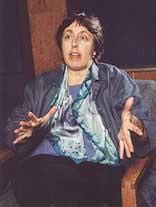A Quote by Desmond Tutu
When I talk of forgiveness I mean the belief that you can come out the other side ... a better person than the one being consumed by anger and hatred. Remaining in that state locks you in a state of victimhood, making you almost dependent on the perpetrator. If you can find it in yourself to forgive then you are no longer chained to the perpetrator. You can move on.
Related Quotes
Forgiveness is the key to breaking the cycle of karma and reincarnation. Forgiveness doesn't mean: "What you did was okay." It simply means, "I'm no longer willing to carry the heavy toxic burdens of anger, resentment, and victimhood in my soul." You can work on healing, uplifting, and changing situations from a place of forgiveness, instead of from a place of resentment. Forgive yourself and everyone, and you are free!
I love, because my love is not dependent on the object of love. My love is dependent on my state of being. So whether the other person changes, becomes different, friend turns into a foe, does not matter, because my love was never dependent on the other person. My love is my state of being. I simply love.
Holding anger is a poison. It eats you from the inside. We think that hating is a weapon that attacks the person who harmed us. But hatred is a curved blade. And the harm we do, we do to ourselves. Forgive, Edward. Forgive...no one is born with anger. And when we die, the soul is freed of it. But now, here, in order to move on, you must understand why you felt what you did, and why you no longer need to feel it.' She touched his hand. 'You need to forgive your father.' ~pgs 141-142
To offer no resistance to life is to be in a state of grace, ease, and lightness. This state is then no longer dependent upon things being in a certain way, good or bad. It seems almost paradoxical, yet when your inner dependency on form is gone, the general conditions of your life, the outer forms, tend to improve greatly.
It is very tempting to take the side of the perpetrator. All the perpetrator asks is that the bystander do nothing. He appeals to the universal desire to see, hear, and speak no evil. The victim, on the contrary, asks the bystander to share the burden of pain. The victim demands action, engagement, and remembering.
Forgiveness does not mean that we suppress anger; forgiveness means that we have asked for a miracle: the ability to see through mistakes that someone has made to the truth that lies in all of our hearts. Forgiveness is not always easy. At times, it feels more painful than the wound we suffered, to forgive the one that inflicted it. And yet, there is no peace without forgiveness. Attack thoughts towards others are attack thoughts towards ourselves. The first step in forgiveness is the willingness to forgive.
If no one remembers a misdeed or names it publically, it remains invisible. To the observer, its victim is not a victim and its perpetrator is not a perpetrator; both are misperceived because the suffering of the one and the violence of the other go unseen. A double injustice occurs-the first when the original deed is done and the second when it disappears.
Forgiveness means that I continually am willing to forgive the other person for not being God — for not fulfilling all my needs. I, too, must ask forgiveness for not being able to fulfill other people's needs. … The interesting thing is that when you can forgive people for not being God, then you can celebrate that they are a reflection of God.






































